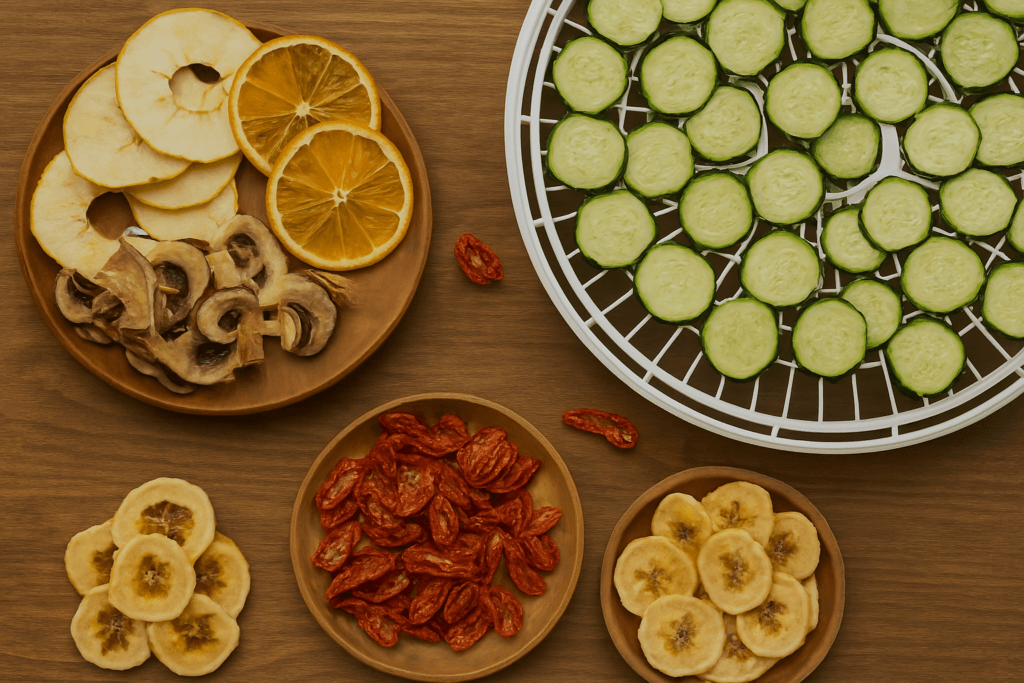
Why Dehydrate Food?
Dehydrating food isn’t just for survivalists or off-grid living—it’s a budget-friendly, health-conscious way to preserve food, reduce waste, and stock your pantry with delicious snacks.
Benefits of Dehydrating:
- Long Shelf Life – Properly stored dehydrated food can last months or even years.
- Nutrient Retention – Low-temp drying preserves most vitamins and minerals.
- Convenient & Lightweight – Perfect for camping, hiking, or emergency kits.
- No Additives – Control every ingredient and skip the preservatives.
How Does Dehydrating Work?
Dehydrating removes moisture using low heat and airflow. This halts the growth of bacteria, mold, and yeast. No refrigeration or preservatives needed!
Typical Temperature Settings:
- Fruits: 130–140°F
- Vegetables: 125–135°F
- Meats (Jerky): 160°F
- Herbs: 95–105°F
Beginner Tips for Dehydrating
If you’re just starting out, keep these simple tips in mind:
- Slice Evenly – Uniform pieces dry at the same rate.
- Don’t Overlap – Keep pieces spaced for even airflow.
- Rotate Trays – Especially for stackable dehydrators.
- Pre-Treat Fruits & Veggies – Use lemon water to prevent browning.
- Label & Date Everything – Trust us, dried basil and oregano look real similar later.
Easiest & Most Common Foods to Dehydrate
Start simple! These foods are beginner-friendly and super versatile:
| Food | Prep Tips | Dehydrating Temp | Time |
|---|---|---|---|
| Apples | Peel, core, slice; optional cinnamon. | 135°F | 6–12 hours |
| Bananas | Slice ¼”, dip in lemon juice. | 135°F | 6–10 hours |
| Strawberries | Hull and slice. | 135°F | 6–10 hours |
| Tomatoes | Slice or halve. | 135°F | 8–12 hours |
| Zucchini | Slice into chips, season. | 125°F | 6–10 hours |
| Carrots | Peel and steam-blanch. | 125°F | 6–10 hours |
| Kale | Remove stems, tear leaves. | 115°F | 3–6 hours |
| Herbs | Rinse and pat dry. | 95°F | 1–4 hours |
| Jerky (Beef/Turkey) | Thin slice, marinate overnight. | 160°F | 4–8 hours |
Top 5 Food Dehydrators: Ratings & Reviews
1. Excalibur 3926TB – Best Overall
- 9 trays, 15 sq ft
- 105–165°F temp range
- 26-hour timer
Perfect for bulk drying
Bulky & premium-priced
2. COSORI Premium – Best Mid-Range
- 6 stainless steel trays
- Digital timer & thermostat
Quiet and user-friendly
Slightly smaller capacity
3. Nesco Snackmaster Pro – Best Budget Pick
- 5 trays (expandable to 12)
- Adjustable thermostat (95–160°F)
Compact and affordable
No timer, uneven drying if not rotated
4. Magic Mill – Best for Families
- 7 stainless trays
- Rear-mounted fan for even drying
Spacious and value-packed
Some plastic components
5. Presto Dehydro – Best for Beginners
- 4 trays (expandable)
- Fixed temp (~165°F)
Super budget-friendly
No temp control or timer
Dehydrator Comparison
| Dehydrator | Drying Area | Temp Range | Timer | Best For |
|---|---|---|---|---|
| Excalibur 3926TB | 15 sq ft (9 trays) | 105–165°F | 26-hour | Bulk drying |
| COSORI Premium | 6 trays | 95–165°F | Yes (Digital) | Everyday use |
| Nesco Snackmaster Pro | 5 trays (expandable) | 95–160°F | No | Budget-conscious |
| Magic Mill | 7 trays | 95–165°F | Yes (Digital) | Families |
| Presto Dehydro | 4 trays (expandable) | Fixed (~165°F) | No | Beginners |
Dehydrating vs. Freeze-Drying: What’s the Difference?
| Feature | Dehydrating | Freeze-Drying |
|---|---|---|
| How It Works | Heat + airflow removes moisture | Freeze then vacuum removes moisture (sublimation) |
| Moisture Removed | 80–95% | 98–99% |
| Shelf Life | 6 months – 1 year+ | 10–25 years |
| Nutrient Retention | Moderate | High |
| Texture After Drying | Chewy or crisp | Light and airy |
| Rehydration Speed | Slower | Very fast |
| Equipment Cost | $40–$300+ | $1,000+ |
| Best For | Snacks, everyday prep | Long-term food storage, emergency use |
🧾 TL;DR – Quick Summary
- 🧾 TL;DR – Quick Summary
- Dehydrating food is an easy, affordable way to preserve fruits, veggies, herbs, and meats.
- It extends shelf life, reduces food waste, and makes healthy snacking simple.
- Top dehydrators include Excalibur, COSORI, and Nesco—ranging from beginner-friendly to bulk-capacity models.
- Best beginner foods to dehydrate: apples, bananas, strawberries, kale, jerky, and herbs.
- Freeze-drying offers longer shelf life and better nutrient retention—but it’s expensive and slow.
- Great for homesteading, prepping, healthy living, and off-grid food storage!
- Dehydrate for everyday use & savings.
- Freeze-dry for long-term food storage & emergencies.
Top-Rated Freeze Dryers on Amazon (2025)
While true home freeze dryers are rare and pricey, here are some of the top options currently available:
VEVOR Vacuum Freeze Dryer Mahine
- 8.8–13.2 lbs batch capacity
- Adjustable timer and temp
- Stainless steel trays
- Great for fruits, meats, and more
HNZXIB 4-Layer Tray Freeze Dryer
- Freeze-drying area: 0.46㎡
- Ideal for high-moisture foods
- Great for home and lab use
Labfeng -35°C Scientific Freeze Dryer
- Cools to -35°C
- SECOP compressor for fast chilling
- Compact, high-performance unit
Cleaning & Storage Tips
- Wash trays with warm soapy water after use.
- Wipe down inside components weekly.
- Store in a dry, cool space.
- Use vacuum-sealed bags or airtight containers for best results.
Final Thoughts
Whether you’re prepping for off-grid life, saving money, or making healthy snacks, dehydrating is one of the smartest food skills to learn. With the right dehydrator and a little practice, you’ll be stocking your pantry like a pro in no time.
